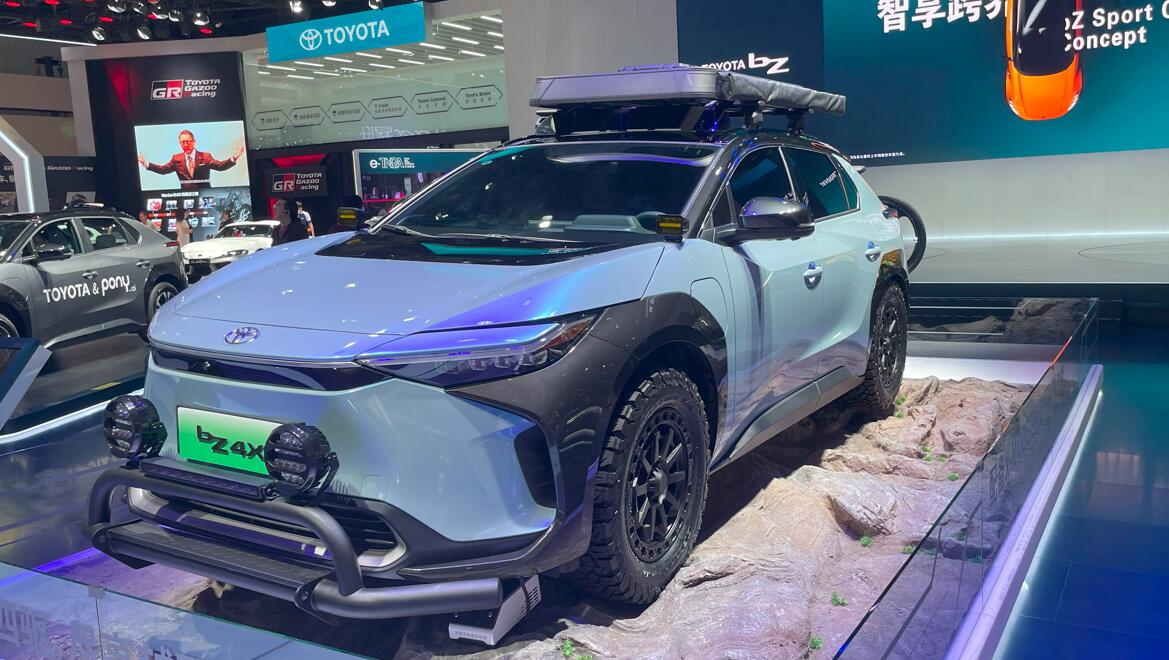In June, NEV penetration rate was 58.8 percent for China's local car brands, 30.9 percent for luxury brands and just 3.7 percent for mainstream joint venture brands.

(A Toyota bZ4X on display at the April 2023 Shanghai auto show. Image credit: CnEVPost)
As China's new energy vehicle (NEV) sector grows rapidly, Japanese automakers that have failed to offer any competitive products are facing more difficulties here.
Toyota's joint venture with GAC Group,GAC Toyota, has terminated the contracts of about 1,000 dispatched workers early and offered them compensation, Reuters said in a report on Monday.
The affected workers were employed by labor service companies and sent to work at a plant in the southern city of Guangzhou, according to the report.
In light of recent production levels, GAC Toyota has prematurely terminated the contracts of about 1,000 workers with the labor companies, the company said in a statement, according to the report.
Established on September 1, 2004, with GAC and Toyota each contributing 50 percent, GAC Toyota had 19,000 employees at the end of June and a standard annual production capacity of 1 million vehicles, according to its website.
In a response to local media outlet Shanghai Securities News, GAC said the move was made because of fierce competition in the current market and in light of the current situation.
The situation facing GAC Toyota reflects a common problem for mainstream joint ventures in China -- the lack of competitive EV models at a time when sales growth of traditional fuel vehicles has slowed down significantly.
In the first half of the year, GAC Toyota's retail sales were 429,662 units, down 5.2 percent from the same period last year, according to the China Passenger Car Association (CPCA).
China's retail auto sales in the first half of the year were 9.53 million units, up 2.93 percent year-on-year. NEV retail sales in the first half of the year were 3.09 million units, up 37.58 percent year-on-year.
While local carmakers are betting heavily on NEVs, mainstream joint ventures, especially Japanese carmakers, have been slow to respond in China.
China's new energy passenger vehicles saw retail sales of 665,000 units in June, with a penetration rate of 35.1 percent.
NEV penetration rate of local brands was 58.8 percent, luxury brands 30.9 percent, and mainstream joint venture brands only 3.7 percent, according to the CPCA.
In years past, German and Japanese brands were the foreign brands with the highest share in China. Currently, the share of German brands is basically stable, while Japanese brands have declined significantly.
In June, the share of German brands in China's auto market was 21.19 percent, and has basically remained above 20 percent in the past two years.
Japanese brands' share fell to 17.81 percent in June, down from 21.58 percent a year earlier, according to the CPCA.
The only pure-electric model GAC Toyota currently offers in China is the bZ4X, an SUV that went on sale in China on October 10, 2022, with a price range of RMB 199,800 ($27,960) to RMB 287,800 at launch.
In February this year, GAC Toyota announced an RMB 30,000 price cut for the bZ4X, bringing the starting price down to RMB 169,800.
Even so, the model still seems to have failed to excite Chinese customers, and its sales have never made it into the CPCA's rankings of the highest-selling models at retail.
($1 = RMB 7.1454)